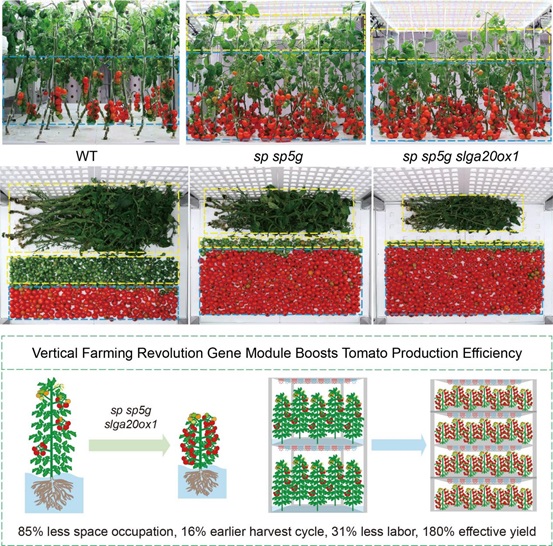Vertical farming, also referred to as plant factory systems, represents an innovative agricultural approach that combines controlled-environment agriculture with vertical cultivation techniques to enable industrial-scale crop production. However, this technology-driven farming model faces significant challenges including excessive energy demands and limited availability of crop varieties optimized for indoor cultivation, which impeded the industrial-scale expansion of plant factory systems.
A new study published on May 12 in the
Journal of Integrative Plant Biology (
https://onlinelibrary.wiley.com/doi/10.1111/jipb.13927) by the Prof. XU Cao’s team from the Institute of Genetics and Developmental Biology, Chinese Academy of Sciences, in collaboration with Prof. CHEN Fan’s team from Yazhouwan National Laboratory, has successfully engineered tomato germplasm optimized for vertical farming by leveraging genome editing to integrate Green Revolution gene homologs and anti‐florigen genes.
The global climate changes, declining land quality, water scarcity and rapid urbanization pose serious threats to traditional agricultural production and food security. Therefore, it is imperative to establish a resilient food supply system to enhance comprehensive food production capacity and ensure food security. The vertical farming system offers a paradigm-shifting solution, combining three strategic advantages: 1) Production stabilization through climate buffering, 2) Supply chain resilience via decentralized vertical farming, and 3) Emergency response capacity using modular containerized plant factory.
The large-scale implementation of vertical farming still encounters two primary challenges. One is the high costs associated with facilities and operations, along with significant energy consumption, leading to increased production expenses. The other one is a lack of crop varieties that are specifically suitable for vertical farming. The plant architecture, growth cycle, and other characteristics of most traditional staple crops and fruit/vegetable varieties are generally not well-suited for vertical farming. This is particularly true for solanaceous vegetables, such as tomato, cucumber, and pepper, which possess complex plant architecture and long harvest cycles, which has confined plant factory system to the production of dwarf and fast-growing leafy vegetables. Therefore, it is imperative to accelerate the genetic improvements of crops specifically suitable for vertical farming thereby enhancing production efficiency.
To address this, Prof. XU Cao’s team aggregated the Green Revolution gene homologs GA20ox with anti-florigen genes SP and SP5G, successfully creating a molecular module designed to revolutionize vertical farming. Knocking out the tomato SlGA20ox1 gene leads to a promising plant architecture suitable for vertical farming, characterized by short stems and a compact canopy. When cultivated in a commercial vertical farm equipped with a multi-layer LED automated hydroponic growth system, the slga20ox1 mutant saved the space occupation by 75%, achieving a 38%-69% fruit yield increase with high-density planting, efficient space utilization, and low lighting energy consumption. By combining mutations of the SlGA20ox1 gene with the SP and SP5G genes, we have created a more compact plant architecture with accelerated flowering and synchronized fruit ripening. In commercial vertical farms, the sp sp5g slga20ox1 mutant reduced space occupancy by 85%, shortened the harvest cycle by 16%, and increased effective yield by 180%, significantly enhancing production efficiency.
Since the gibberellin and florigen pathways are conserved cross various crops, the molecular module developed in our study to revolutionize vertical farming is promising to be applicable for the rapid customization of specialized varieties in other solanaceous vegetable for vertical farming. Overall, this study provides a new solution for rapidly develop fruit and vegetable cultivars tailored for vertical farming.
Figure. Genome editing of molecular module for “vertical farming revolution” significantly enhance tomato production efficiency (Image by IGDB)
Contact:
Prof. XU Cao
Institute of Genetics and Developmental Biology, Chinese Academy of Sciences
Email: caoxu@genetics.ac.cn
 Figure. Genome editing of molecular module for “vertical farming revolution” significantly enhance tomato production efficiency (Image by IGDB)Contact:Prof. XU CaoInstitute of Genetics and Developmental Biology, Chinese Academy of SciencesEmail: caoxu@genetics.ac.cn
Figure. Genome editing of molecular module for “vertical farming revolution” significantly enhance tomato production efficiency (Image by IGDB)Contact:Prof. XU CaoInstitute of Genetics and Developmental Biology, Chinese Academy of SciencesEmail: caoxu@genetics.ac.cn CAS
CAS
 中文
中文




.png)
